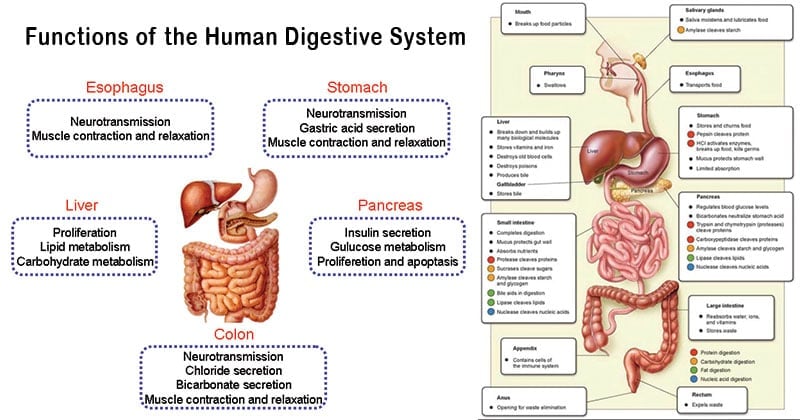- Digestion is important for breaking down food into nutrients, which the body uses for energy, growth, and cell repair.
- The digestive system is not only uniquely constructed to perform its specialized function of turning food into the energy but also responsible for packaging the residue for waste disposal.
- It is essential to good health because if the digestive system shuts down, the body cannot be nourished or rid itself of waste.

Image Sources: Han-Xing Wan et al. and Pinterest.
Interesting Science Videos
Digestion and Absorption
- Food and drink must be changed into smaller molecules of nutrients before the blood absorbs them and carries them to cells throughout the body.
- Digestion is the breakdown of food into small molecules, which are then absorbed into the body.
- It involves a series of organs, each with its own specialized functions that together convert food into essential nutrients that are absorbed into the body and utilized for different functions.
- The most essential nutrients include Carbohydrates, Proteins, Fats, Vitamins, Minerals, and Water.
- Carbohydrates are the body’s main source of energy important for the functioning of the brain, nervous system, kidneys, and muscles.
- Proteins, along with growth and repair, preserve muscle mass, hormone production, enzyme production, enable a properly functioning immune system and provide energy if carbohydrates aren’t available.
- Fat is used for cell membranes, energy, absorbing fat-soluble vitamins and supporting the internal organs functioning.
- Vitamins and minerals are involved in forming energy, building protein, making collagen, protecting eyes, bones, skin, lungs, and intestines. Major minerals, or electrolytes, balance bodily fluids. Trace minerals perform various tasks such as carrying oxygen throughout the body, blood clotting, immune system and strengthening bones.
- Water is important for keeping a normal body temperature, urination, bowel movements, sweating, protecting the spinal cord and providing a barrier for joints.
- Thus, it is this digestive process that provides the building blocks the body needs to live, function, and to stay healthy.
Elimination of waste material
- During the digestion process, chyme passes from the small intestine through the ileocecal valve and into the cecum of the large intestine.
- Any remaining nutrients and some water are absorbed as peristaltic waves move the chyme into the ascending and transverse colons.
- This dehydration, combined with peristaltic waves, helps compact the chyme. The solid waste formed is called feces.
- It continues to move through the descending and sigmoid colons. The large intestine temporarily stores the feces prior to elimination.
- The body expels waste products from digestion through the rectum and anus.
- This helps to get rid of the solid or semisolid remains of the food that could not be digested or absorbed in the intestines.
Protection and Sustaining and Overall health
- According to clinical assistant professors of medicine at NYU Langone Medical Center, the gastrointestinal system is more than the body’s primary site of taking in and absorbing nutrients.
- This system of critical digestive organs also acts as a type of switchboard or communication center to and from the brain, and functions as one of the body’s frontlines in the fight against the disease.
- The acid and enzymes in the stomach work to sterilize the food taken in and, in this way, protect the body from illness and infection.
- In addition, the digestive tract is an important source of immune function in the body. All foods we eat are in communication with immune receptors in the digestive tract, triggering hormones and various cell types that help the body with its immune function.
- It further aids in immune function through the presence of Peyer’s patches which are large oval clusters or nodules of lymphoid tissue that are found on the wall of the small intestine. Peyer’s patches help to monitor the lining of the gut and, when necessary, generate an immune response, producing antibodies that will fight rogue antigens and allergy-causing substances.
- The digestive system is the home of the “gut microbiome”—a diverse community of different bacteria types that play a vital role in both fighting disease and maintaining our health.
References
- Waugh, A., & Grant, A. (2009). Ross and Wilson: Anatomy and Physiology in Health and Illness. (11th edition). Churchill Livingstone
- https://my.clevelandclinic.org/health/articles/7041-the-structure-and-function-of-the-digestive-system
- http://www.ibdclinic.ca/what-is-ibd/digestive-system-and-its-function/
- https://www.livescience.com/22367-digestive-system.html
- https://med.nyu.edu/medicine/gastro/about-us/gastroenterology-news-archive/your-gut-feeling-healthier-digestive-system-means-healthier
- https://www.livestrong.com/article/355090-what-are-functions-of-proteins-carbohydrates-fats-water-vitamins-and-minerals/
- https://www.visiblebody.com/learn/digestive/digestive-absorption-and-elimination
